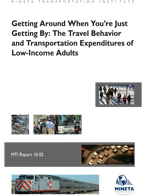- 408-924-7560
- mineta-institute@sjsu.edu
- Donate
Getting Around When You're Just Getting By: The Travel Behavior and Transportation Expenditures of Low-Income Adults
How much do people with limited resources pay for cars, public transit, and other means of travel? How does their transportation behavior change during periods of falling employment and rising fuel prices? This research uses in-depth interviews with 73 adults to examine how rising transportation costs impact low-income families. The interviews examine four general areas of interest: travel behavior and transportation spending patterns; the costs and benefits of alternative modes of travel; cost management strategies; and opinions about the effect of changing transportation prices on travel behavior.
Key findings include:
- Most low-income household are concerned about their transportation costs.
- Low-income individuals actively and strategically manage their household resources in order to survive on very limited means and to respond to changes in income or transportation costs.
- In making mode-choice decisions, low-income travelers—like higher-income travelers—carefully evaluate the costs of travel (time and out-of-pocket expenses) against the benefits of each of the modes.
- Some low-income individuals in our sample were willing to endure higher transportation expenditures—such as the costs of auto ownership or congestion tolls—if they believed that they currently benefit or would potentially benefit from these increased expenses.
- Although low-income households find ways to cover their transportation expenditures, many of these strategies had negative effects on households. The report concludes with recommendations on how to increase transportation affordability, minimize the impact that new transportation taxes or fees have on low-income people, and develop new research and data collection to support the previous two efforts.
ASHA WEINSTEIN AGRAWAL, PhD
Asha Weinstein Agrawal is Director of the MTI National Transportation Finance Center and also Associate Professor in the Department of Urban and Regional Planning at San José State University. Her research interests in transportation policy and planning include transportation finance, pedestrian planning, and planning and transportation history. She has a BA from Harvard University, an MURP from the London School of Economics and Political Science, and a PhD from the University of California at Berkeley. For a complete listing of her publications, seehttp://www.sjsu.edu/faculty/weinstein.agrawal/.
EVELYN A. BLUMENBERG, PhD
Evelyn Blumenberg is an Associate Professor of Urban Planning in the School of Public Affairs at the University of California, Los Angeles. Professor Blumenberg’s research examines the effects of urban structure—the spatial location of residents, employment, and services—on economic outcomes for low-wage workers, and on the role of planning and policy in shaping the spatial structure cities. Her recent research focuses on the role of transportation in facilitating the welfare-to-work transition, the travel behavior of immigrants, and the transportation expenditure burden of low-income and minority households. Professor Blumenberg holds a bachelor’s degree in political science from the University of California, Berkeley, and a master’s degree and PhD in Urban Planning from the University of California, Los Angeles.
SARAH ABEL
Sarah Abel is a graduate student earning her Master’s degree in Urban and Regional Planning at San Jose State University. She has interests in environmental and transportation planning policy. Sarah was recently nominated by her department to win the Continuing Student Scholarship and was selected by the California Planning Foundation to receive the Northern Section Scholarship. She was also accepted into the 2010 Dwight David Eisenhower Transportation Fellowship Program awarded by the Federal Highway Administration for her thesis project titled "Increasing Bus Ridership and Transit Cost-Assistance Awareness Among San Jo’s Very-Low Income Community." She has her Bachelor degrees in Mathematics and Environmental Studies from the University of California Santa Cruz.
GREGORY PIERCE
Gregory Pierce is a Masters student in the Department of Urban Planning at the University of California, Los Angeles. His research interests include the economic vulnerability of the urban poor, water privatization and urban sanitation, particularly in the context of the developing world. He holds a bachelor’s degree in economics and history from the University of California, Los Angeles.
CHARLES N. DARRAH, PhD
Chuck Darrah is Chair and Professor in the Department of Anthropology at San José State University. An applied anthropologist, his research interests include work, technology, organizations, and health care. He has an MA from the University of Alberta, an M.P.H. from San José State University, and a PhD from Stanford University.
-
Contact Us
San José State University One Washington Square, San Jose, CA 95192 Phone: 408-924-7560 Email: mineta-institute@sjsu.edu






